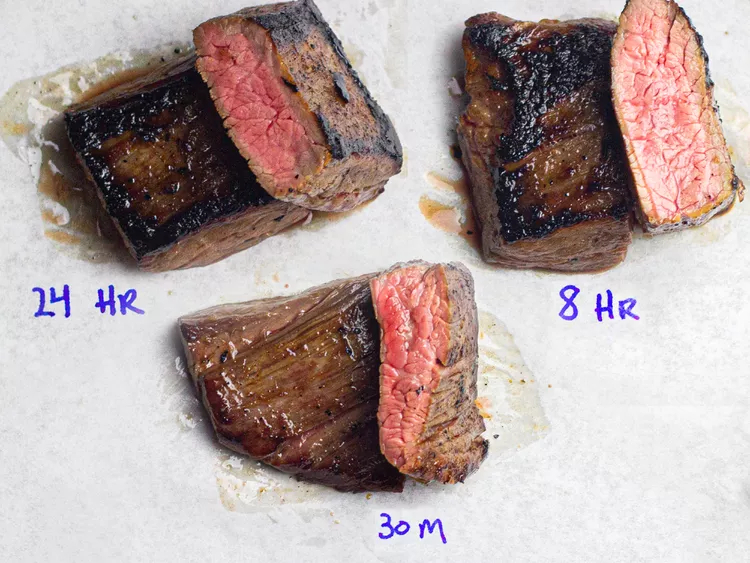Tim Chin, a food writer for Serious Eats, conducted experiments on chicken, pork, and beef. With a background in food science, he analyzed both the theory and practice of marinating to find answers.
A basic marinade typically consists of:
: Water: from plain water, fruit juice, wine, beer, or soy sauce.
: Salt: from table salt, fish sauce, or other salty seasonings, which helps season the meat and retain moisture.
: Sugar: including various types of sugar, milk, or honey, which balances the flavor and helps create an attractive brown color (caramelization).
: Spices and aromatics: herbs, pepper, garlic, ginger, fruit zest, etc., to add fragrance.
: Fat: olive oil, sesame oil, vegetable oil, etc., which helps the meat cook faster and adds richness.
: Acids, bases, enzymes: vinegar, baking soda, etc., which alter the meat's structure by breaking down proteins, but the effectiveness depends on the amount and marinating time.
 |
Marinating helps meat retain moisture, stay tender, and develop a beautiful color. Photo: Serious Eats |
Marinating helps meat retain moisture, stay tender, and develop a beautiful color. Photo: Serious Eats
Chin's research revealed two distinct benefits of marinating. First, the marinade acts as a type of brine. As the salt gradually penetrates the meat, muscle fibers contract less during cooking, allowing the meat to retain moisture and become more tender. The ideal marinating time for this effect is between 1 and 8 hours.
Second, the spices and sugar in the marinade contribute to creating an appealing brown color and aroma when the meat is exposed to high heat.
However, Chin's study also confirmed that most aromatics like garlic, pepper, or five-spice powder mainly adhere to the surface and rarely penetrate deep into the meat. Monosodium glutamate (MSG) is an exception, as it can permeate the meat and impart a noticeable umami flavor.
It's important to note that chicken marinated for over 24 hours becomes tough, with a jelly-like texture, while pork and beef are less affected. Conversely, marinating for under 30 minutes has almost no effect.
Acids like lemon juice, vinegar, or yogurt tenderize meat but can make the surface mushy if used excessively.
Baking soda makes meat juicy and tender but can leave an unpleasant odor if used in large quantities.
Enzymes from pineapple or papaya break down meat quickly, easily making it mushy, so they should only be used for short marinating times.
Based on his experiments, Chin concluded that marinating is beneficial, but one shouldn't expect spices to miraculously penetrate deeply. Marinades primarily help retain moisture and create surface effects during cooking. To infuse the meat with flavor from the inside, consider injecting marinades, cutting the meat into smaller pieces, or pounding it before cooking.
Bao Nhien (Via Seriouseats)












